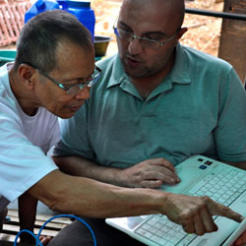International Disaster Volunteers' operations are ending in Manila. Andrew Chagger explains how the organisation developed an exit strategy to ensure its work's sustainability.
In just a few days I’ll be leaving Manila as our charity ends its international volunteer operations here. Moving forward we’ll continue to support our Filipino partners, so this isn’t the end of our involvement here, but it’s a big change. After being personally based here for the last seven months I’m definitely feeling mixed emotions at the moment.
On one hand I’m looking forward to seeing my family and friends in the UK again. On the other, I’m sad to be leaving our Filipino partners and I can’t help reflecting on what more we could have achieved if time and money weren’t issues. In short, I’m again wrestling with the issues I blogged about when leaving Haiti in November of 2011 and asking myself if our charity has chosen the right time to withdraw.
As I noted in my blog about leaving Haiti, deciding when to withdraw, and implementing an exit strategy, is a challenge faced at some point by almost all charities working internationally. The factors involved in making the decision will be different for each organisation, so it’s difficult to make generalisations, but our own reasons for leaving Manila do perhaps illustrate some common themes.
We arrived in the Philippines in February with the goal of reducing the impacts of recurrent floods in the vulnerable community of Banaba, just outside Manila. Before arriving we decided that to make the biggest possible impact we would partner with a local organisation to support their existing efforts rather than start our own projects from scratch.
Part of the reason for choosing this strategy was simple financial reality. Raising funds for preventative projects is notoriously hard in comparison to response work in the aftermath of a disaster. As local efforts are, by their very nature, often more cost effective we knew we could maximise use of our available resources by supporting them.
More importantly, we also knew that by investing in programmes which were already firmly rooted in the local community, our investments would be sustainable as our local partners would continue to make use of them after our volunteers eventually left.
So, since we arrived we’ve focused on building the capacity of our local partners to meet their community’s needs more effectively. This has included making investments in their existing infrastructure and providing training and systems that make their workload easier to manage. So, in many ways we’ve been implementing our exit strategy here since we first stepped off the plane back in February.
This is all easily said of course but the question still remains as to how we know these efforts have been successful enough that we’re now able to withdraw our international staff and volunteers?
Well, last month our theories were put to the test by an enhanced monsoon. Five days of almost non-stop rain caused flooding across Manila. In Banaba alone thousands of people were forced to evacuate their homes. While it was obviously a tough week we were at least pleased with how our work to date has paid off.
For example, our local partners used the FrontlineSMS system I introduced in my July blog to send over 2,000 texts that helped coordinate local response efforts. Part of these response efforts involved the use of flood rescue boats that we’ve funded. One of those boats alone was used to evacuate over 90 families trapped by the rising water.
So, while the storm clouds caused a lot of chaos the silver lining for us was that the systems and tools we’ve provided helped our Filipino partners to cope remarkably well during a real emergency. As a result we’ve decided that our remaining funding is now best directed through local actors rather than by maintaining our international presence here.
Of course, in an ideal world I’d love to stay and roll-out the systems we’ve developed to support other communities who could also use them. Sadly, like many other small charities we have to face up to the reality of limited resources and avoid the temptation to spread them too thinly. So in the end I feel confident that our decision to focus on supporting our existing partners, rather than take on new ones, is the right choice.
In the interim I still feel like I have a thousand loose ends to tie-up before I leave but I also remember feeling exactly the same when I left Haiti and our projects there didn’t end when I boarded the plane. Ultimately I guess that whether I had two days left, or 200, I’d still feel like there was work to be finished.









